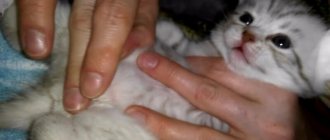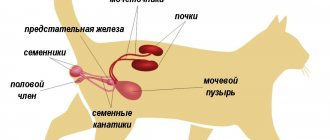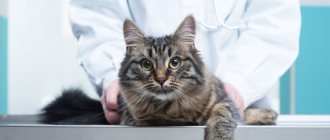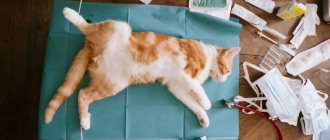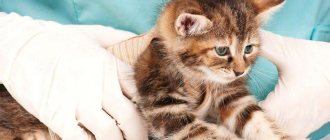Neutering cats is a process in which an animal is rendered incapable of reproducing. To understand whether such an effect on the animal’s body is humane, let’s look at the reasons why owners decide to sterilize.
Firstly, breeding cats is a troublesome task, requiring quite large financial costs, not to mention the difficulties in finding new families for kittens, which always run the risk of becoming homeless. From this point of view, it would be much more humane to sterilize a cat, that is, it is better not to give kittens a chance to be born than to condemn them to starvation and death on the street.
Secondly, such manifestations of sexual behavior of cats as marking of territory and loud screams at night can undermine the patience of even the most calm and balanced owner. Is it fair to be aggressive towards your cat because of physiological characteristics beyond her control?
And finally, constantly recurring estrus without mating with a male, as well as long-term use of hormonal drugs, lead over a certain time to inflammatory diseases of the reproductive system of cats, such as pyometra, ovarian or mammary cancer and others (sterilization of cats also solves this problem).
The romantic myth that a female animal must give birth at least once to realize her maternal instincts is beautiful, but it is refuted by scientific research, the results of which state that a cat does not need kittens due to her physiology.
Among some parents who are especially responsible for raising a child, there is also an opinion that a cat must give birth in order for their own child to witness the miracle of birth. It is unlikely that this will be possible, since most often cat birth occurs at night or in secluded places. Unfortunately, sometimes the only thing that children take away from such a “lesson” is that animals are born at the whim of adults and are abandoned to their fate also at their whim.
Sterilization is the only humane solution for those owners who truly love their cat and, due to certain circumstances, cannot breed kittens.
Sterilization exists in several types : surgical, medicinal and radiation . The most reliable and favorable in terms of consequences for the cat’s body is surgical sterilization, the methods of which include:
Tubal occlusion is a tightening of the fallopian tubes, as a result of which conception becomes impossible, but the hormonal background of cats does not change, that is, estrus, screaming and the cat’s demands continue.
Hysterectomy - removal of the uterus while preserving the ovaries. Such sterilization has the same consequences for cats as tubal occlusion.
Both of these operations have an extremely adverse effect on the health of the animal and are rarely used in modern veterinary practice.
Ovariectomy – removal of the ovaries. A change in hormonal levels occurs, the production of sex hormones stops and, as a result, estrus stops, the risk of ovarian cysts and false pregnancies disappears. In domestic veterinary practice, the concept of “sterilization” is often understood specifically as oophorectomy. This option of surgical sterilization is the most desirable, but is only suitable for young and nulliparous cats.
Ovariohysterectomy – removal of the ovaries and uterus. This operation is called castration and is performed on cats older than one year who have given birth and have pathological processes in the uterus.
Unfortunately, veterinarians have not yet reached a consensus on the optimal age of a cat for sterilization . Thus, a number of Western experts believe that in order to prevent future health problems for a cat, sterilization should be carried out before maturity or before the first heat, at the age of 8 weeks to 6 months . The genitals at this time are already well defined.
Other veterinarians are inclined to believe that early sterilization is fraught with negative consequences for the endocrine system of cats, kidneys, retina, and also interferes with the development of a normal proportional body build, and that sterilization should be carried out immediately after the first heat. Surgery performed before the second heat reduces the risk of mammary tumors by 25%. And finally, the most orthodox zoo specialists will advise you to wait at least up to a year so that your pet’s body is fully strengthened and formed.
Types of sterilization
Sterilization is a surgical operation performed to remove the ability of an animal to produce offspring. In some cases, the possibility of hormone production remains. Not so long ago, during this procedure, only tubal ligation was performed, but now veterinarians are inclined to believe that this manipulation is not enough to completely sterilize the animal. Effective types of sterilization:
- hysterectomy (uterus removed);
- ovariohysterectomy (uterus and ovaries are removed);
- oophorectomy (only the ovaries are removed).
In order for the operation to proceed without complications, the British cat should be sterilized on time, before the first heat. The procedure is performed using general anesthesia. The reproductive organs are removed through a small incision in the abdomen, after which the doctor applies a suture - removable or self-absorbing. The process lasts 30 minutes. Some clinics offer post-operative care.
There is a method in which an ultra-small incision is made to remove the uterus and ovaries. This operation requires greater precision when working with a specialist, so it is more expensive.
Another method of sterilizing pets is with the help of medications. In this case, a medicine is injected under the animal's skin to promote temporary castration. The effect of the procedure lasts up to 3 years.
Early castration
It is better to castrate cats without waiting for their sexual instinct to develop and contact with cats. Castration is considered early if the kitten is between 2 and 4 months old.
Buyers can enter into an agreement with breeders, where they undertake to castrate the boy they are buying, but approximately a third of new owners do not comply with this agreement.
Important: for the first time, early castration began to be practiced in animal shelters to reduce the number of stray cats.
Why is an animal castrated at an early age?
Breeders practice early castration of kittens to prevent the use of animals to produce offspring.
Cats with deviations from breed standards are castrated early.
Kittens also have their reproductive organs removed to reduce the number of stray animals.
Positive points
The advantages of early castration of British kittens are quite significant in order not to be afraid of carrying out this procedure at a tender age. They are:
- minor bleeding during intervention;
- high tissue elasticity and the associated ease of manipulation with surgical instruments;
- due to the small size of the organs - minor trauma;
- introduction of a limited amount of drugs and anesthesia;
- very fast recovery after anesthesia;
- rapid healing of wounds;
- There are practically no complications.
Disadvantages of the method
Despite all the advantages of early castration of fold-eared and other British cats, there is a fly in the ointment.
Doctors note that when castrating babies, it can be quite difficult to choose the right dose of anesthesia, and this can harm the functions of the central nervous system.
If the kitten’s testicles are not lowered into the scrotum before the operation, but are still located in the abdominal cavity, then the complexity of the intervention increases. It will be necessary to carry out manipulations in the abdominal cavity, and this is fraught with the development of complications.
Young kittens have not yet developed a strong immune system. In addition, it is weakened by preventive vaccinations. All this can adversely affect the immune system of the little Briton.
Pros and cons of sterilizing cats
Advantages of the procedure:
- absence of unwanted offspring;
- reduction of irritability and nervousness of the animal;
- eliminating the risk of contracting infectious diseases from street cats.
The main disadvantage is the use of anesthesia, which is not always well tolerated by animals. It is necessary to ensure that the cat's health is examined before surgery. One of the negative consequences of sterilization is obesity, so it is advisable to monitor your pet’s diet and prevent overeating.
TOP 12: RANKING OF THE BEST FOOD FOR BRITISH CATS
Food rating for the British:
- Orijen – 80% protein, 20% vegetables and fruits
- Acana – 70% protein, 30% vegetables and fruits
- Wildfield – 60% protein, 40% vegetables and fruits
- Farmina – grain-free food + probiotics, medicinal herbs
- Trainer – food for animals with sensitive digestion, kidney problems, etc. These foods help maintain health. Suitable for animals with gluten intolerance. Products for processing into feed are steamed.
- Science Plan (Hills) is a good food for everyday nutrition, well digestible, does not cause allergies, natural antioxidants and preservatives, a wide range of feeds, excellent distribution.
- Bosch cellulose and maize additives are harmful and can cause allergies.
- OK Passion – not suitable for sensitive cats
- Purina ProPlan - high in protein, rice is used as a cereal, but wheat flour is still added. Probiotics.
- Royal Canin (Royal Canin) - there is an everyday line and a medicinal one. Everyday series - a lot of preservatives (the Russian line of food is not recommended, it is better to give preference to the French one). The medicinal series is perfectly balanced and has good reviews from veterinarians and has a healing effect.
- Premil – additives and flavor enhancers. No gluten.
- Josera - Overall a good food, it rarely causes allergies, it contains corn gluten.
*All these foods contain minerals, vitamins, and beneficial additives.
Take proper care of your pets and choose the best food for them!
WHAT IS THE BEST FOOD FOR BRITISH CATS?
So which food is best?
In any case, there is not just one best food for each animal. A food that is suitable for one individual may not be suitable for another.
It is important for us when the animal feels healthy, has an excellent appetite, excellent health and digestion. It is important when the pet eats and plays with pleasure, and at the same time the coat is shiny, and the tests are normal
Food should be selected individually. Perhaps over time you will change several foods before you find the perfect one for your Briton.
I would also like to note that complete nutrition for British cats does not consist only of dry food. You can get acquainted with the correct diet in our article.
| In our nursery you can “buy a real British kitten.” We have many different colors, we will help you choose and answer all your questions! |
When surgery should not be performed
Veterinarians are inclined to believe that surgery performed on an animal under 6 months of age may result in a delay in the development of the body.
It is not advisable to sterilize a domestic cat during heat, as recovery from anesthesia will be more difficult.
The optimal time for this is 2 weeks before the heat or 2 weeks after the end. But sometimes sterilization is also carried out during the period of estrus, if there is a threat to the health of the animal.
What the owner needs to do
First of all, the owner of the animal must carry out anthelmintic treatment of the pet before surgery. It is recommended to deworm every 3 months. Antiparasitic treatment includes not only getting rid of worms, but also lice, fleas and ticks. Before carrying out surgical manipulation, it is advisable to do treatment for worms 10-14 days in advance. It is important to note that if deworming was carried out less than one month ago, then it is not necessary to re-give the anthelmintic drug. The veterinarian who will carry out the sterilization must select the type and dosage of the drug.
An important aspect when preparing for surgery is timely vaccination. All pets must be vaccinated, regardless of whether the owner plans to sterilize or not. Carrying out abdominal surgery, which is ovariohysterectomy, in the absence of vaccinations, is associated with a high risk of infection. At least 30 calendar days must pass from the last vaccination before the animal can be operated on.
Sometimes owners refuse to vaccinate their pets. In this case, veterinary specialists at the clinic offer an injection of a special serum that allows you to develop a lasting immune response lasting 2 weeks against various infectious diseases.
The last point that the owner must fulfill is to keep the animal on a forced diet. A fasting diet involves complete food restriction for a period of 10 to 12 hours. During this period, the animal should not be given food, but water can be given. This preparation is carried out in order to minimize the risks of aspiration pneumonia in the animal after sterilization. While anesthesia is in effect, your pet may vomit. If there is food in the stomach, vomiting may cause particles to enter the respiratory system.
Differences between sterilization of young and adult individuals
Adult cats (over 1 year old) are also sterilized, although they are much more difficult to tolerate the procedure. To maintain the health of your pet, sterilization should be carried out after a full examination.
One of the negative consequences may be the formation of tumors, such as the development of breast cancer. If a cat has already had more than 2 periods of heat, the likelihood of developing cancerous tumors exceeds 25%.
The owners of a British cat must approach this issue responsibly so that the animal lives a long and healthy life. Experts believe that to prevent complications, the operation should be carried out at the optimal time.
Intrauterine methods
Copper-containing intrauterine system (coil)
The coil thickens cervical mucus and forms a barrier for sperm.
Copper has a toxic effect on sperm, immobilizing them, and also suppresses ovulation. pros
- prolonged action, allowing you to forget about contraception for several years
- no systemic effect on the body
- can be used during lactation
Minuses
- it cannot be used for nulliparous women, since against the background of the IUD there is a risk of the formation of intrauterine synechiae and adhesions, which can lead to infertility; also, due to anatomical features, nulliparous women have a narrower cervical canal, which makes it difficult to install the spiral.
- the IUD does not protect against STDs and, accordingly, is only suitable for women who have one permanent healthy sexual partner;
- using a copper-containing IUD increases the risk of inflammatory diseases of the uterus and appendages by 5–6 times compared to women who do not have IUDs;
- the IUD can cause longer and more painful menstruation;
- if a woman has a history of multiple abortions, invasive interventions, curettage, there is a risk of developing cervical insufficiency, i.e. incompetence of the cervix, which can lead to expulsion (loss) of the device.
Protected hormone-containing coils
The hormones contained in the system act in the uterine cavity, make the mucous membrane thinner, and immobilize sperm.
All this makes fertilization and implantation of the fertilized egg impossible. pros
- Reliable contraceptive effect for five years
- No systemic effect
- has a therapeutic effect: indicated for patients with a history of endometrial hyperplastic processes, uterine fibroids
- can be used during lactation
Minuses
- No protection against STDs
- Higher price compared to copper-containing spiral
Hormonal contraception
This is perhaps the most effective method of all existing today.
Hormonal drugs differ in dosage (minidose - estrogen content no more than 30 mcg, microdosed - no more than 20 mcg, large dosages are not currently used), components, and route of entry into the body.
There are two types of drugs: combined and “mini-pill” group. Combined contraceptives contain estrogens (ethinyl estradiol) and gestagens, “mini-pills” contain only gestagens.
Preparations from the “mini-pill” group are indicated for nursing women who cannot take estrogens, but only gestagens. Also, “mini-pills” can be taken by women who cannot tolerate the estrogen component.
Types of drugs: tablets (taken orally), vaginal ring (hormones penetrate through the vaginal mucosa) and patch (transdermal route - hormones enter through the skin).
Methods of administration. The tablets must be taken daily, at the same time. It is especially important to take drugs from the “mini-pill” group at the same time. The tablets are generally taken for 21 days, after which they take a break for 7 days.
The vaginal ring is inserted into the vagina for 21 days, after which a break is taken for a week.
The patch is changed every 7 days.
The advantage of alternative routes of administration (ring, patch) is that you do not need to remember every day to take the pill and there is no primary passage through the liver and gastrointestinal tract, which reduces the load on them.
This is especially important if a woman has problems with the gastrointestinal tract or chronic cholecystitis. pros
- reliable contraceptive effect (if a woman does not miss taking pills, the guarantee is almost 100%)
- active protection of the ovaries and endometrium (mucous) of the uterus from cancer
- regulation of the menstrual cycle
- reduction of pain during menstruation
- cosmetic effect (some OCs help cope with acne and normalize skin condition)
- therapeutic effect (the doctor will help you choose hormonal contraceptives that are indicated for patients with uterine fibroids and endometriosis).
Minuses
- the need for strict discipline, control over taking medications at the same time (especially important for the “mini-pill”)
- do not protect against STDs
- any hormonal drugs affect metabolism (metabolism), which can lead to fluctuations in body weight, although in modern drugs this effect is minimal;
- there is an effect on the vascular link, on the blood coagulation system, therefore, when taking contraceptives, constant monitoring of hemostasis is necessary. If a woman has a predisposition to varicose veins, hypertension, or in the family there have been cases of diseases of the cardiovascular system, accompanied by thrombosis, heart attacks, strokes, then the patient needs a comprehensive examination of the hemostatic system before starting to take hormonal contraceptives;
- There is a period of adaptation to hormones. Over the course of 2–3 months, nausea, headaches and pain in the mammary glands may sometimes occur; there may be slight spotting in the middle of the cycle, changes in libido, and mood swings. Therefore, medical supervision of the use of drugs during the first months of use is mandatory.
- hormonal contraceptives have a number of contraindications: active smoking (more than 5 cigarettes per day), severe somatic diseases, severe decompensated diabetes mellitus, thrombosis, varicose veins, heart attacks, strokes, arterial hypertension, frequent migraines, etc.
Sterilization
Medical sterilization is a surgical technique that can be used on both men and women. This is a reliable method of 100% protection against pregnancy, a good choice for people who are definitely not planning any more children.
After the operation, the ability to conceive in women cannot be restored; in men, there is a small (less than 30%) chance of restoring reproductive function by repeating the operation within five years after the intervention.
Female sterilization is a laparoscopic operation during which the fallopian tubes are cut, which reliably prevents the possibility of pregnancy.
Male sterilization (vasectomy) is a simple operation that lasts about 20 minutes.
During surgery, the vas deferens is ligated and divided. Sterilization does not affect erection, the amount of seminal fluid and the ability to experience orgasm. pros
- 100% protection against unwanted pregnancy
- the issue is resolved once and for all
Minuses
- irreversibility of the operation
- need for surgery
- There are legal restrictions on this operation
Medical sterilization as a special medical intervention in order to deprive a person of the ability to reproduce or as a method of contraception can be carried out only upon a written application from a citizen over thirty-five years of age or a citizen who has at least two children, and in the presence of medical indications and informed voluntary consent citizen - regardless of age and presence of children. Article 57. Federal Law of November 21, 2011 N 323-FZ “On the fundamentals of protecting the health of citizens in the Russian Federation”
Emergency contraception
In case of unprotected sexual intercourse, you can use so-called emergency contraception.
These drugs are aimed at contraception, they are not termination of pregnancy. The tablet contains a large dose of progestin drugs that cause rejection of the endometrial mucosa. pros
- The ability to avoid unplanned pregnancy even in a critical situation
Minuses
- This is a colossal dose of gestagens, which can lead to failures and cycle disorders. This remedy cannot be used on a regular basis - it is a huge stress for the body.
When choosing contraception, you should definitely contact a gynecologist. Before prescribing this or that drug, the doctor will conduct an examination, which includes an examination on a chair, taking a smear for oncocytology. Also, if there are signs of endocrinopathy (increased hair growth, acne), it is necessary to examine the hormonal levels. Since hormones thicken the blood and affect hemostasis (blood coagulation system), it makes sense to conduct a comprehensive examination of the state of the hemostatic system. In addition, it is recommended to do an ultrasound examination of the pelvic organs (uterus and appendages) and mammary glands. All these procedures are minimally invasive, painless, they are not difficult to complete, and they will help to avoid possible complications due to long-term use of contraceptives.
Preparing for surgery
When monitoring a cat's health, sterilization should be carried out after a complete examination. Also, the animal must be vaccinated no later than 3-4 weeks before surgery. To make sure that the animal’s health is normal, a general blood and urine test is taken, as well as some biochemical tests if necessary.
An ultrasound, ECG, and x-ray may be prescribed (if the pet is more than 1 year old). If deviations from the norm or pathology are detected, the veterinarian prescribes treatment. The pet should not be fed in the evening and morning before surgery. Using anesthesia on a full stomach can cause vomiting and further complications. The animal should not eat for at least 12 hours before sterilization, and it is advisable not to drink water in the morning before the operation. For the postoperative period, it is advisable to buy a blanket.
General information about the procedure
Castration is the complete removal of a cat's testicles through an incision in the scrotum. This is a simple procedure. It is performed under general anesthesia, and the cat does not feel pain and wakes up 10-15 minutes after the intervention. Externally, the consequences of the operation are invisible.
A domestic neutered cat has many advantages over an unoperated one.
Important: a distinction should be made between castration and sterilization. During the last operation, the cat's spermatic cords are pulled or cut, leaving the testicles. He will not have offspring, but the attraction to the opposite sex will remain.
Pros of the operation
It is possible, and sometimes necessary, to castrate a British cat. This is convenient for the owners and beneficial for the pet, because as a result of the operation the animal:
- will stop marking territory;
- will not run away from the apartment in search of the cat;
- will not irritate the owner by shouting;
- will become less aggressive;
- will live longer;
- will be less at risk of genital diseases. Kittens of decorative breeds are often born without testes in the scrotum, which increases the risk of developing tumors.
Possible complications
Castration of British cats implies the possibility of developing complications.
There is a possibility that British people will develop the following in the early postoperative period:
- long-term pain syndrome;
- disorders of the digestive system;
- bleeding;
- suppuration, including abscesses, due to infection of surgical sutures;
- hernia;
- injuries caused by animals due to negligence.
Normally, a cat should feel pain for no longer than two days. The digestive tract can restore normal functions within a week. If the specified period is exceeded, the animal must be shown to a veterinarian.
Possible later complications:
- the occurrence of urolithiasis;
- difficulty urinating due to damage to the ureter;
- weakening of the urethral sphincter associated with hormonal changes;
- sudden weight gain.
Ready-made feed
Many owners prefer to give their Britons dry food and wet canned food - it’s convenient and simple. But the products must be of high quality - not lower than premium.
It is better to avoid buying cheap food from the nearest supermarket. Economy class food contains practically no natural meat. But they contain ballast substances, dyes, flavors and other harmful components.
You should carefully study the composition of the feed. Meat should come first. Good products contain vitamins, minerals and amino acids that support the health and strengthen the immune system of the British cat. A minimum of carbohydrates is encouraged - they lead to weight gain.
Selection of industrial feed
Owners of British cats consider the following brands to be the best food:
- Earthborn Holistic;
- Go! Natural Holistic;
- Bosch Sanabelle Grande;
- Acana;
- Orijen;
- Eukanuba;
- Eagle Pac Cat Holistic;
- 1st Choice.
This is a super premium class and holistic food. They are quite expensive, but their composition fully satisfies the needs of the cat's body.
If your budget is limited, you can purchase premium food for the British:
- Purina Pro Plan;
- Brit Premium;
- RoyalCanin;
- Hill's.
The Royal Canin company produces a special food for British kittens that can be fed to babies aged 4 to 12 months - British Shorthair Kitten. It is highly digestible and contains prebiotics that support the functioning of the gastrointestinal tract.
Royal Canin produces British Shorthair Adult food for adult cats. It helps Britons maintain muscle mass. Omega-3 fatty acids strengthen joints and maintain their mobility.
For kittens, pregnant, lactating, spayed, neutered, elderly cats or pets with any diseases, buy food from specialized lines. All well-known manufacturers have such names.
Before choosing food for your British cat, it is better to consult a veterinarian. He will give individual nutritional recommendations.
Norms
| Weight of an adult cat in kilograms | Norm of dry food per day in grams | Kitten age in months | Norm of dry food per day in grams |
| 3 | 45 | 1-2 | 30-50 |
| 4 | 55 | 2-4 | 40-65 |
| 5 | 65 | 4-6 | 55-70 |
| From 6 kg | 12 g per 1 kg of weight | 6-12 | 60-80 |
| Weight of an adult cat in kilograms | Norm of wet food per day in grams | Kitten age in months | Norm of wet food per day in grams |
| 3 | 190-200 | 2-3 | 170-210 |
| 4 | 230-240 | 3-6 | 210-300 |
| 5 | 250-260 | 6-9 | 210-300 |
| From 6 kg | 300 | 9-12 | 170-255 |
| Cat's weight in kilograms | Meat and offal per day in grams | Cereals in grams 3 times a week | Vegetables in grams daily | Fermented milk products daily in grams |
| 3 | 80 | 45 | 10-15 | 70 |
| 4 | 100 | 60 | 20-30 | 80 |
| 5 | 125 | 75 | 25-35 | 100 |
| 6 | 150 | 90 | 30-40 | 130 |
Video: Food for neutered cats ProPlan
From all of the above, we can conclude that a castrated British cat needs food with a reduced content of minerals such as calcium, magnesium, and phosphorus to prevent the appearance and prevention of urolithiasis. If food contains a high content of these minerals, this can lead to the formation of tripelphosphates - kidney and bladder stones.
To prevent ICD from a British cat’s diet, you must first exclude fish, the main source of these microelements. In all other respects, all natural products, which are described in the article “Feeding kittens with natural products,” are appropriate. Feeding>
Or switch your animal to super premium food, which almost all contain components that acidify urine, which helps prevent the formation of urinary stones.
Despite the fact that today most premium food manufacturers have lines for neutered cats, you should know that there is no significant difference in the composition of food for neutered and non-neutered cats
When choosing food, pay attention first of all to the composition, and not to the general inscriptions on the packaging. If you decide to feed a neutered cat with dry food, then experiments are not appropriate here, and you need to stick to feeding only the same food all the time. You can compare and read the compositions of different feeds that are presented on our market HERE
You can compare and read the compositions of different feeds that are presented on our market HERE
If you decide to feed a castrated cat dry food, then experiments are not appropriate here, and you need to stick to feeding only the same food all the time. You can compare and read the compositions of different foods that are presented on our market HERE.
The formation of stones in the urinary system in castrated cats is also facilitated by the fact that such animals urinate less often. Therefore, your neutered British cat should drink plenty of water. Moreover, if the cat’s diet consists only of dry food, then water should be consumed in an amount of 3:1. If your animal drinks little water, then read the article “How to teach British cats to drink water.” How>
Remember, you should not overfeed your British cat, regardless of whether he is neutered or not. After castration, cats become phlegmatic, and they replace their interest in cats with food. Feed your pet small, frequent meals.
Because it simply won’t work any other way - the cat will beg you for food all the time. Monitor your pet's weight, and if it increases significantly, switch to low-calorie food, or reduce the portion of the food you are currently feeding. Under no circumstances should you give in to your cat asking for food, remember, this will only harm him.
To increase your pet's vitality, your veterinarian may prescribe injections of vitamin B12 and sex hormones. Use these medications only with your doctor's permission, and never on your own.
And finally, I would like to say that a healthy cat is an active cat. Therefore, regardless of whether the cat is neutered or not, he should exercise a lot. The British are naturally lazy, so you need to move them and try to play with them every day. Use homemade cat toys or buy toys from a pet store.
Attention, TODAY only!
Similar
How many months are British cats neutered?
Having reached puberty, male cats become restless, nervous, and damage furniture, so owners who do not plan to have offspring castrate their pets in advance.
The character of a castrated British cat changes for the better, the animal becomes calm, carefree and docile. Castration also prevents serious pathologies of the reproductive organs. The main thing is to carry out the procedure in a timely manner so that the cat does not experience complications.


